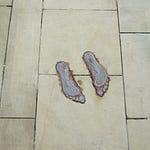Circumstances for learning this attention exercise
feeling rested
feeling physically uncomfortable
feeling agitated
feeling curious
The work of mindfulness practice is invisible from the outside.
It just looks like garden-variety resting.
From the inside, though, a lot is going on. Instead of passively resting, we're developing attentional skills.
Sometimes—but not always—we investigate comfortable sensations in the body. Noticing the breath can be a good way to do this. It's a very popular method, but people get tangled up expecting their thoughts to disappear, which rarely happens.
Let me try to clarify what's actually happening inside a mindful awareness exercise designed around comfortable sensations.
Instead of trying to relax the body and mind for ten to twenty minutes, I frame it as a scouting mission. You're trying to locate comfortable sensations in the body to savor for a few seconds at a time. Instead of trying to relax, you're trying to improve your ability to detect and savor relaxing sensations.
This doesn't mean that every sensation in the body will be comfortable. It also doesn't mean your responsibilities and concerns will let you forget them. It helps to go in knowing that your attention will repeatedly be pulled into the stories on your mind.
Set the stage for relaxation by:
finding one comfortable sensation in the body
savoring it for a few seconds
steering back to the sensory data collection whenever you realize you've wandered away from it
Sometimes, this will feel relaxing, and at other times, it will feel agitating. It's easy to convince yourself that you're the only living person with a head full of thoughts, which makes this game challenging, but nothing could be further from the truth.
Most people go through life never realizing that they could practice fighting less with essential aspects of their humanity—like thoughts and feelings—and getting better at savoring other aspects, like pleasant sensations in the body that will never demand their attention.
Exercise
Settle in. Notice the sensations that reveal the presence of your body. Remember, you're not trying to stop thinking. You're using body sensations to strengthen the skill of prioritizing what you attend to and what you allow to be peripheral.
Listen to this episode with a 7-day free trial
Subscribe to Phenomenal Awareness to listen to this post and get 7 days of free access to the full post archives.













